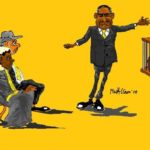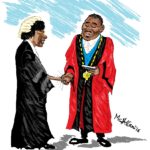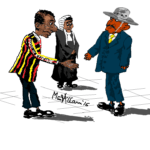A few days ago, I opined that the debate of whether or not to hold 2021 general elections is tantamount to shadow boxing provided that the status quo is maintained.
Picking it’s supremacy from article 2, the constitution of the republic of Uganda unequivocally highlights that, Uganda will go to general elections after every five years pursuant to articles 1(4), 59(1), 77(3), 78(2), 105(1) and 181 unless there exists in Uganda such circumstances that hinder the country to organize a normal general election, these are provided under article 77(4) and recaptured in article 103(3)(d) of the constitution.
Article 77(4) provides that, ‘where there exists a state of war or a state of emergency which would prevent a normal general election from being held, Parliament may, by resolution supported by not less than two-thirds of all members of Parliament, extend the life of Parliament for a period not exceeding six months at a time.’
Well, reading the article first above mentioned one would easily infer that, the circumstances highlighted under article 77(4) are absolute; and therefore, existence of the same in the country automatically stays the idea of holding elections in abeyance.
To construe article 77(4) of the constitution, one ought to focus on the phrase thus, ‘where there exists a state of war or a state of emergency which would prevent a normal general election from being held…..’ This literally means that, it is not automatic that whenever there exists a state of war or a state of emergency in the country, elections must be suspended, contrariwise it qualifies the point that the state of war or state of emergency must be such as to prevent the country from holding a normal general election.
The challenge I find with this provision is that, it does not qualify what amounts to preventing a country from holding a normal general election subsequently positioning the country at the mercy of legislators, the danger with this is that, if such an issue is tabled before a bunch of frightened legislators characteristically engulfed in phobia for their electorates like those in the 10th Parliament, then, I think that, the country will be destined for incessant extensions of general election.
That said, it is important to note that juxtaposing article 77(4) with 110(4) creates a lacuna in our constitution, consider a situation where a state of emergency is declared in conformity with article 110(1) and (3) a few months away from the country’s general election, and then the said state of emergency continues to exist beyond the time the country is to hold her general election, of course parliament will make an extension of the elections after being convinced that an election cannot be held given the circumstances (these being influenced by their phobia to meet electorates).
There exists a legal gap in our laws that makes it impossible for the country to handle a scenario where Parliament continuously and unfairly extends the state of emergency pursuant to article 110(4), and then subsequently extends elections pursuant to articles 77(4) and 103(3)(d) while giving unreasonable circumstances, without causing a constitutional crisis, after all, it’s at their discretion to determine the gravity of what the constitution highlights as being circumstances that warrant extension in both cases.
The other issue that my learned friend Deus Mukalazi raises in his article published by Eagle online on 15th April, 2020 as being a lacuna though, I squarely disagree with him is that article 105(1) of the constitution must be adhered to regardless of whether or not the country is in a state of emergency which according to him, means that the president must vacate his office on expiry of the five year tenure after which the speaker of Parliament proceeding under article 104(7) takes over as the caretaker of the office of the presidency.
And that, that is when articles 77(4) and 103(3)(d) are motioned then the speaker of Parliament continues as a caretaker until such a time when a substantive president is voted.
Deus further argues that, though expiry of the president’s tenure while there exists a state of emergency in the country is not among the circumstances highlighted under article 104(7) as being those that warrant the speaker to assume the caretaker role, the article nevertheless applies because the framers of the constitution did not envisage a situation of a state of emergency existing at the time when the country is bound to hold her general election.
With due respect, I find his argument outrageous and therefore not legally tenable because article 99 of the constitution vests all the executive powers in the president, and there is no other law suggesting otherwise when the country is in a state of emergency.
Therefore, I wish to argue that a state of emergency in the country though has the effect of rendering some articles of the constitution inactive, it doesn’t affect articles that establish, give functions and sustain the operation of the three arms of government ipso facto, the legal effect of such articles stipulating the tenure of office of political leaders is driven into abeyance by declaration of a state of emergency, the counting stops thus the president, once a state of emergency is declared retains the executive powers until such a date when elections are held and the president elect takes the oath of allegiance to serve the country as president.
That said, it should be noted that only the president is vested with the duty under article 99(3) to ensure safety of Ugandans, therefore removal of the person whose duty is inter alia to ensure safety of Ugandans in a situation where the safety of the citizens is paramount doesn’t add up logically, as such the state cannot be without a substantive president save under such circumstances highlighted in articles 104(7) and 109 clauses 1, 4 and 5 of the constitution.
While closing my submission on this issue, I have deemed it necessary to furnish here provisions of the law that further buttress the argument that the president’s office even under a state of emergency remains operational vide article 110(6) of the constitution and section 100(1)(d) of the Local Government Act. Article 110(6) provides thus, ‘during any period when a state of emergency declared under this article exists, the President shall submit to Parliament at such intervals as Parliament may prescribe, regular reports on actions taken by or on behalf of the President for the purposes of the emergency’.
Also, under section 100(1)(b) of the Local Government Act the president is given powers to takeover the administration of local governments during a state of emergency, the law provides thus, ‘the President may, with the approval of two-thirds of all the
members of Parliament, assume the executive powers of any district in any
of the following circumstances—
(a)……..
(b) where a state of emergency has been declared in that district or
in Uganda generally’
Lastly all the constitutional provisions aforementioned notwithstanding, Uganda is not under a state of war or a state of emergency thus making it implausible for articles 110(3) and 77(4) of the constitution to be motioned subsequently rendering it impossible for the country to extend the 2021 general election; that said, unfortunately under circumstances where the state of emergency has been declared pursuant to article 110(1), the general election would be extended to even beyond 2030 and the decision remains legally binding.
Au revoir
Enoch Okoler Opio.








